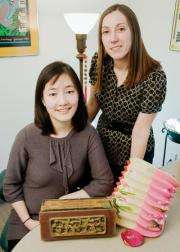Genealogical tourism redefining leisure travel market, professor says

For the work-weary, the word "vacation" may conjure images of leisurely, carefree days at the beach sipping umbrella drinks. But according to published research by a University of Illinois expert in tourism and recreation, genealogical tourism is one of the fastest growing markets in vacation travel because it represents a conscious shift away from relaxation and into the realm of personal enrichment and fulfillment.
The increase in popularity of genealogical tourism reflects contemporary tourists' preference for authentic, lived experiences over the bubble-like environment of an all-inclusive resort or a pleasure cruise, says U. of I. recreation, sport and tourism professor Carla Santos.
"Genealogical tourism provides an irreplaceable dimension of material reality that's missing from our postmodern society," Santos said.
Traveling to the old church where one's great grandparents used to worship in rural Ireland, or buying a loaf of bread from a tiny grocery store in the village where one's grandmother was from in Greece create a critical space to imagine and feel life as a form of continuation, says co-author and U. of I. graduate student Grace Yan.
The study, published in a recent issue of the Journal of Travel Research, also asserts that the popularity of genealogical tourism is due to living in a world where mediated, inauthentic experiences have become such an ingrained part of everyday life that we're almost unaware of it.
"Genealogical tourism capitalizes on this by allowing individuals to experience the sensuous charms of antiquity, and provides a way of experiencing something eternal and authentic that transcends the present," Santos said.
In academic analyses of the 1980s and early 1990s, tourism was seen through the lens of an escape from the reality of the workaday world. Today, scholars approach travel and tourism in a much more complex and nuanced fashion, the authors said.
"We believe that movement is due partly to the increasing sociological awareness of the post-industrial society that we currently live in," Santos said. "With tourism studies developing a more sophisticated interpretative paradigm, more meanings of tourism have been discussed in academia, including the hunt for exoticism and experiencing nostalgia."
The movement away from escapism toward personal enrichment in the last 15 years is also a baby boomer-influenced trend.
"According to our research, the baby boomer generation now constitutes the primary profile of genealogical travelers," Yan said. "Aging plays an important role in defining a person's choice of tourism, and genealogical travel is contemporary society's way of attaining a more coherent and continuous, albeit imagined, view of ourselves in connection with the past."
The authors say another part of what's contributing to the rise in popularity of genealogical tourism is the diaspora of races, cultures and ethnicities in the U.S. longing for an authentic connection to their roots.
"Diaspora definitely plays an important role in popularizing genealogical tourism," Santos said. "Individual cultural and ethnic identities exist in fragmented and discontinuous forms in the U.S. Traveling to identify with an unknown past seems to give existence to meanings and values that the individual then carries forward on into their present."
Since diaspora is a ubiquitous condition in our multicultural country, "our ancestors' past seems less retrievable and almost mythical," Yan said.
The authors say that exploring, re-defining and confirming our identities are life-long projects.
"A lot of us may feel that there's a tension between the need to feel connected and the need to be individualistic," Santos said. "Genealogical travel gives us a practical way to explore those feelings and move toward a deeper understanding of our identities."
Genealogical tourism also serves as a "communicative platform" for our doubts and fears about our hyper-connected world, Santos said.
"Not only does it help to mitigate the desires and anxieties about our age, genealogical tourism also encourages us to take a more humanistic approach toward issues of belonging, home, heritage and identity," she said.
Provided by University of Illinois at Urbana-Champaign














